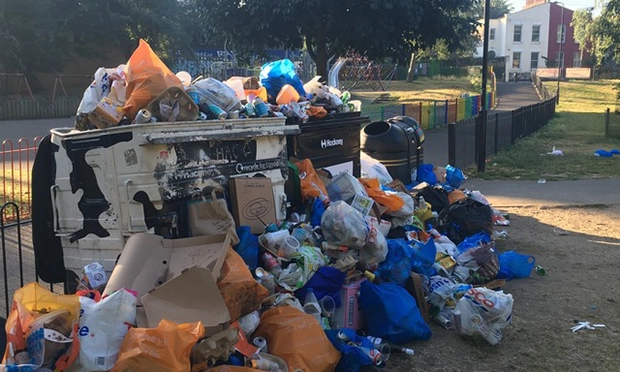London Fields residents in ‘horror’ over council plan to cut litter collections

Bins in London Fields, pictured in June 2020. Photograph: Kevin Flemen
London Fields campaigners have expressed their trepidation over the Town Hall’s proposal to save money by reducing litter collections in parks.
A document has revealed that Hackney Council is exploring ways to make savings in its parks service, which looks after 58 spaces across the borough.
Options include reducing evening litter collections and stopping seasonal bedding planting.
London Fields User Group (LFUG) chair Kevin Flemen fears the situation with rubbish and litter at the park near Broadway Market could get “unsanitary and unpleasant” – especially if the market is extended to Fridays.
He said London Fields gets it “especially bad”, with bottles and takeaway food packaging ending up in the park.
“The council isn’t managing litter brilliantly, and [the thought of] it getting worse fills me with horror,” he said.
The Town Hall is staring at a £57m budget deficit over the next three years, and Mayor Caroline Woodley said it is “only responsible” to consider savings options that help protect services such as elderly care and housing.
Flemen said the group understands the “need to manage the budget”.
“However, for parks, especially those with high footfall with additional rubbish from markets, there’s a colossal need to make sure that it is removed,” he continued.
“It should come out of the section that is generating the profit – i.e. the markets.”
In winter, rubbish is manageable, he said, but in the height of the summer, even the additional metal bins put out by the council are often not enough. This is because of the wave of “unsorted dirty litter” that overflows from bins, Flemen explained.
He said people often put their bottles on top of bins when they are full.
If overnight litter collections are reduced, lots of bottles will fall down and break, “not because of people but because of full capacity”, he warned.
As long as the bins are not overflowing and they have big metal bins, London Fields suffers “very limited animal raiding”.
“But if they are overflowing, it’s awful,” he said.
Mayor Woodley said: “If the proposals are approved, evening litter collections will still take place in the summer months, but at a reduced level, and daily morning litter collections will continue to take place throughout the year.”
She added: “No changes to bedding planting will take place until after the summer.”
If approved, seasonal bedding would be replaced with more environmentally-friendly perennial plants.
The council will continue to sow wildflower meadows across its parks and green spaces – something LFUG volunteers also do regularly.
Flemen hopes to see a levy on London Fields takeaway and alcohol premises – akin to the levy paid by Shoreditch’s night-time venues to fund security there.
“The polluter pays principle. And we know the polluters are takeaway and alcohol premises,” he said.
The council is committed to upholding Hackney’s reputation for having “some of London’s best maintained parks”, Woodley said.
“We’re spending £16m managing and maintaining Hackney’s parks and leisure centres over the next three years, including £1.7m on continuing to upgrade park play areas,” she added.
The savings document states that if the proposals are adopted, the borough would still have 58 parks and green spaces for residents to use but “just at a reduced quality/standard”.
LFUG volunteers do weekly litter picks in the park.
Flemen said: “We’re already sending volunteers, [but] we’re not going to fill the gap left by the council.”
